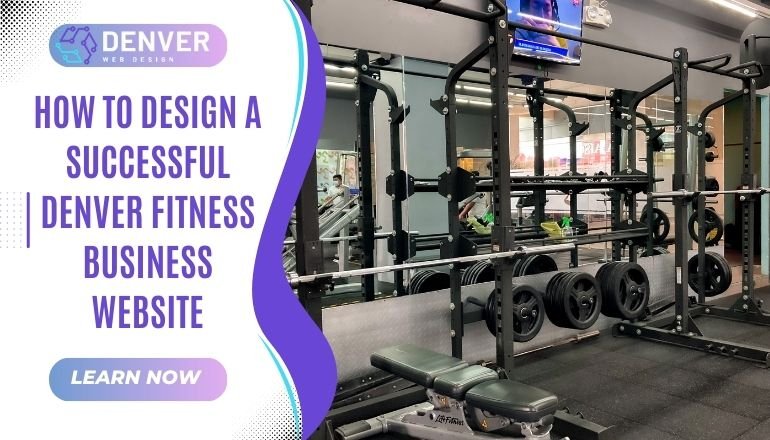
The fitness industry is thriving, and for businesses in Denver, having a professional and user-friendly website is essential to standing out in a competitive market. A well-designed fitness website attracts clients, builds trust, and converts visitors into members. By implementing best practices in web design and focusing on features specific to fitness businesses, you can create a website that delivers results. With insights from Web Design Denver, let’s explore how to design a successful website for your Denver fitness business.
What Is a Fitness Business Website?
A fitness business website is a digital platform designed to showcase your gym, studio, or personal training services. It’s not just a marketing tool; it’s an extension of your brand and a space where potential clients can learn about your offerings, book services, or purchase memberships.
Key Characteristics of a Fitness Website:
- Engaging Visuals: High-quality images and videos of your facilities, classes, or trainers.
- User-Friendly Layout: Intuitive navigation to help users find what they need quickly.
- Interactive Features: Online booking, class schedules, and membership sign-ups.
- Mobile Responsiveness: Optimized for smartphones and tablets to cater to on-the-go users.
By utilizing responsive web design and prioritizing user experience, you can create a website that appeals to both current and prospective clients.
Why Is a Fitness Website Essential for Your Business?
In Denver’s fitness industry, a strong online presence is critical to success. A well-designed website serves as a 24/7 marketing tool that enhances visibility, builds credibility, and drives conversions. Here’s why your fitness business needs an effective website:
1. Attracts New Clients
With a site optimized for SEO websites, your business can rank higher in local Denver search results, making it easier for potential clients to find you.
2. Showcases Your Unique Offerings
Whether you offer yoga classes, personal training, or specialized fitness programs, a custom website highlights what sets you apart.
3. Enhances Customer Convenience
Features like online booking, payment integration, and detailed schedules make it easy for clients to interact with your business.
4. Builds Trust and Credibility
A professional website reflects the quality of your services and reassures clients that your business is reliable.
Key Features of a Successful Fitness Website
1. Online Booking and Scheduling
Allow clients to book classes, personal training sessions, or consultations directly through your website.
2. Mobile Optimization
Many users will access your site via mobile devices, so ensure it’s responsive and user-friendly on all screens.
3. Visual Content
Include high-quality photos and videos of your facilities, trainers, and clients in action to create a strong first impression.
4. Membership Management
Provide options for online membership sign-ups and renewals with secure payment gateways.
5. Testimonials and Reviews
Showcase positive client feedback to build trust and attract new members.
6. Content Management System (CMS)
Use a CMS to update schedules, blog posts, or announcements easily.
Best Practices for Fitness Website Design
1. Focus on Speed Optimization
Fast-loading pages keep users engaged and reduce bounce rates. Use compressed images and efficient coding practices.
2. Clear Navigation and Call-to-Actions (CTAs)
Create an easy-to-navigate menu and include CTAs like “Sign Up Now,” “Book a Free Trial,” or “Join Our Gym.”
3. Local SEO Integration
Optimize for local search terms like “Denver fitness studio” or “personal trainers in Denver” to attract local clients.
4. Engage with Blog Content
Share fitness tips, workout routines, and healthy lifestyle advice to position your brand as an authority in the industry.
5. Emphasize Social Proof
Include success stories, client transformations, and social media integrations to boost credibility.
Common Mistakes to Avoid
1. Ignoring Mobile Users
Failing to optimize for mobile devices alienates a significant portion of your audience.
2. Overcomplicated Designs
Avoid cluttered layouts and excessive elements that can confuse or overwhelm visitors.
3. Neglecting SEO
Without proper SEO, your website won’t reach its full potential in search engine rankings.
4. Unclear Branding
Ensure your website reflects your business’s identity with consistent colors, fonts, and messaging.
5. Lack of Interactive Features
Not including booking or payment options can reduce conversions and frustrate users.
Conclusion: Key Takeaways
Designing a successful fitness business website for Denver’s dynamic market requires a blend of functional design, engaging content, and user-centric features. From mobile optimization to seamless online booking, every element should enhance the user experience and drive engagement.
If you’re ready to take your fitness business to the next level, Web Design Denver specializes in creating custom web solutions tailored to your needs. Start building a website that empowers your brand and grows your client base today!






